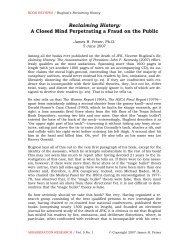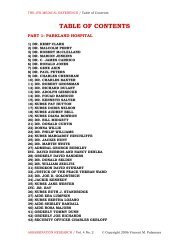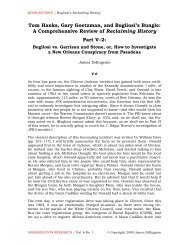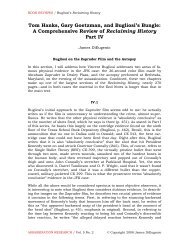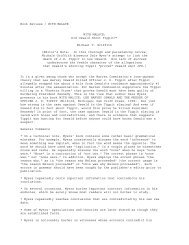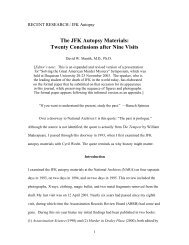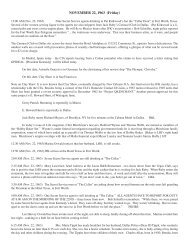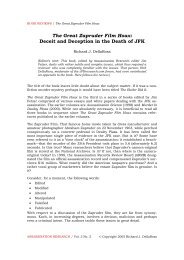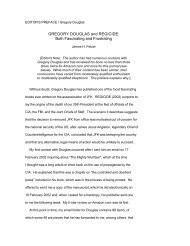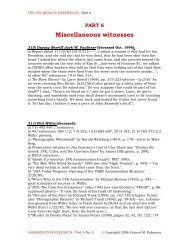A Comprehensive Review of Reclaiming History Part VIII
A Comprehensive Review of Reclaiming History Part VIII
A Comprehensive Review of Reclaiming History Part VIII
Create successful ePaper yourself
Turn your PDF publications into a flip-book with our unique Google optimized e-Paper software.
James DiEugenio 26 Bugliosi’s Bungle, <strong>Part</strong> <strong>VIII</strong><br />
more, Truman worked on the piece for at least ten days; according to a memo<br />
he wrote on December 1, he called Souers for his input; so how could he later<br />
be “quite astounded” at his own column’s contents?<br />
We now come to an utterly fascinating parting shot: Dulles bringing up the recent<br />
“false attacks” on the CIA in relation to Vietnam. He’s probably referring to<br />
the now-famous columns published in October and December 1963. The October<br />
columns were penned by Arthur Krock and Richard Starnes for the New<br />
York Times and the Washington Daily News. The December ones were by<br />
Starnes for the New York World–Telegram. Krock’s piece mentioned a source in<br />
Vietnam who likened the CIA’s growth “to a malignancy” which even the White<br />
House could not control. His source added that if the U.S. ever experienced a<br />
coup, it would come from the CIA, and not the Pentagon. Starnes’ source said<br />
the same: “If the United States ever experiences a Seven Days in May it will<br />
come from the CIA, and not from the Pentagon.” In a column dated December<br />
11, 1963, Starnes explained how Prince Sihanouk <strong>of</strong> Cambodia was worried<br />
about certain CIA elements trying to overthrow him. Starnes later added that an<br />
Agency source told him he was appalled at what was going on in Southeast<br />
Asia, and questioned whether President Kennedy had had any “effective control<br />
over this monstrous bureaucracy”. In a December 3, 1963 column, Starnes<br />
questioned that with Dulles on the Commission, how could the truth about Oswald<br />
in the Soviet Union ever be known? Of course, Kennedy could not have repudiated<br />
the December columns, but I know <strong>of</strong> no place where he repudiated<br />
the October columns. In all probability, Dulles was trying to dupe Truman into<br />
issuing a retraction. But his actions are even more suggestive if he was referring<br />
to those columns—especially when one adds in the fact that he specifically<br />
mentioned Kennedy to Truman in regards to them: because if one looks at the<br />
first generation <strong>of</strong> Kennedy assassination books, no one connected those dots—<br />
Vietnam, those columns, JFK’s death—that early. Was Dulles trying to prevent<br />
anyone from doing so in the near future?<br />
Any objective person would admit that this material on Dulles is relevant in<br />
evaluating the make-up <strong>of</strong> the Warren Commission—especially since he became<br />
its most active member. Yet although you will find Schlesinger’s book in his bibliography,<br />
you will not find Robert Lovett’s name in Bugliosi’s book. Comedian<br />
Lenny Bruce’s name is in the index, but not David Bruce’s—so the influence <strong>of</strong><br />
their report in the firing <strong>of</strong> Dulles is absent. I could also find no reference to<br />
Mary Bancr<strong>of</strong>t—so the possible relationship that Dulles joked about is gone.<br />
And since the quote by Dulles referring to Bancr<strong>of</strong>t is not included, the reader<br />
doesn’t know that Dulles was in Dallas three weeks before the assassination—<br />
or that he was at the Farm the day <strong>of</strong> the assassination. (Werbell’s name is not<br />
in Bugliosi’s index.) Bugliosi does quote from Truman’s article, but what he<br />
does with it is notable: after a long quote, like the Warren Commission, he just<br />
drops it and goes to a new subject—almost like he didn’t want to be accused <strong>of</strong><br />
not mentioning it (Bugliosi, p. 1195). Ray Marcus received the supplementary<br />
material used here early in 2006, a year before <strong>Reclaiming</strong> <strong>History</strong> was published—and<br />
not a page <strong>of</strong> it is in Bugliosi’s massive tome, so the reader never<br />
learns when Truman began the essay, his dialogue with Souers, or, most <strong>of</strong> all,<br />
about the visit by Dulles. Thus, with all this missing, the reader cannot pose<br />
the obvious question: Why did LBJ ask this guy to be on the Commission? To<br />
ASSASSINATION RESEARCH / Vol. 6 No. 1 © Copyright 2009 James DiEugenio



